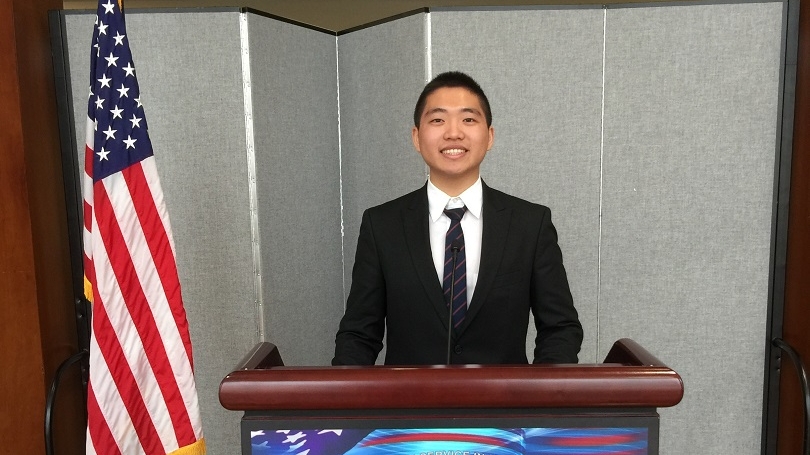
- Public Policy
- Leadership
- Funding
- News & Events
- About the Center
Back to Top Nav
Back to Top Nav
Back to Top Nav
Back to Top Nav
Danny Li '19 interned at the Association for Diplomatic Studies and Training for the 2017 winter term. The following is an excerpt from his internship report.
During this winter I had the opportunity to intern with the Association for Diplomatic Studies and Training (ADST) which is an independent nonprofit organization that advances understanding of American diplomacy and supports the training of foreign affairs personnel at the NFATC’s Foreign Service Institute (FSI) through a variety of programs and activities. In a time when national and international relationships and conversations are becoming increasingly polarized and complex, the need for qualified Foreign Service officials has never been greater. ADST not only provides training and development programs to Foreign Service personnel but also serves a critical role in being a public informant on U.S. foreign policy. ADST has several ongoing activities: – The Foreign Affairs Oral History Collection, which grows by some 80 histories per year, conveys the experiences, analyses, knowledge, and wisdom of both career and non-career foreign affairs practitioners. Moreover, ADST provides advice on publishing to serving and former foreign affairs personnel. Almost 80 books have been published in the two series, and more are forthcoming.
As an ADST Intern, I had the opportunity to research and engage with distinguished foreign scholars, retired or active Foreign Service experts and diplomats, and foreign policymakers and political leaders who are active and influential in the foreign policy community. My responsibilities were to: assist the organization in writing event summaries on the ADST website, interview and write up interview summaries, edit and compile oral histories and book manuscripts, research and monitor current regional and global issues relevant to the organization’s goals, plan and facilitate program events with visiting Foreign Service officials in D.C., help with organizing and implementation ADST’s events, and update databases and publications. Besides fulfilling the above responsibilities, I was chosen to work on a special project: the publication of an e-book detailing the history of the Foreign Service Institute. The book was presented on March 13th, 2017 to celebrate the 70th anniversary of the Foreign Service Institute and American diplomacy.
The experiential opportunities I encountered during my internship at the Foreign Service Institute put to the test the skills and knowledge I learned at Dartmouth and apply them to practical situations. For example, I interviewed the Director of the Foreign Service Institute Ambassador Nancy McEldowney to gather her thoughts on the future of U.S. diplomacy; several of her talking points illuminated themes and concepts that I had learned about and discussed with Professor Michael Mastanduno last term in my U.S. Foreign Policy class. ADST’s location at the National Foreign Affairs Training Center and close proximity to the Foreign Service Institute (FSI) have allowed me to interact with Foreign Service personnel almost daily. On the shuttle ride to FSI, I frequently sit next to Foreign Service officers in training. The stories and world perspectives that they share are truly awe-inspiring. My director is a retired Ambassador who has served in six countries during a twenty-five year career. During my conversations with her, I often find myself connecting her experiences to international relations concepts and events I read and wrote about in my international relations class freshman fall or my comparative politics class last spring. In the long-term, the experiences and wisdom that I learned from the Foreign Service Officers I encountered will help me in my own quest to find the right path for me to conduct public service either through local government or through the Foreign Service.
I have greatly benefitted from my experiences with Rockefeller programs such as D-LAB and MLDP. Participating in D-LAB last year allowed me to reflect and think about leadership in application to work, life, and academics. Thus, I arrived at my internship confident and comfortable in my qualities and skills. Furthermore, I participated in the Management and Leadership Development Program last fall. MLDP equipped me with the tools to succeed in the workplace when interacting with Foreign Service Officers and other government officials. I deeply value the lessons I learned in the program and fully appreciate their impact on my internship experience. As I have accumulated these experiences, I have slowly realized that these learnings build upon one another and strengthen my foundation; this has allowed me to tackle new knowledge and facilitate understanding.